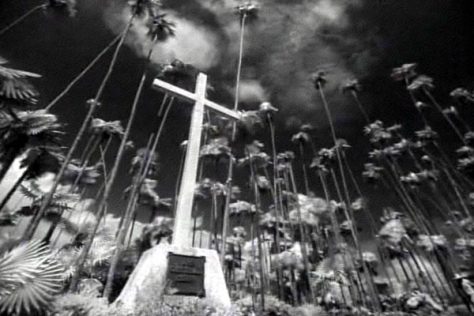By Dennis Hartley
(Originally posted on Digby’s Hullabaloo on June 20, 2015)

“When Mexico sends its people (to America), they are not sending their best… (Mexican immigrants) are bringing drugs and they are bringing crime, and they’re rapists.”
-from Donald Trump’s speech announcing his presidential bid, June 16, 2015
“(African-Americans) rape our women and you’re taking over our country.”
-Charleston shooter’s statement to his victims before opening fire, June 17, 2015
“We don’t have all the facts, but we do know that, once again, innocent people were killed in part because someone who wanted to inflict harm had no trouble getting their hands on a gun.”
-from President Obama’s speech on the Charleston Church shooting, June 18, 2015
“I’m just saying…”
-the author of this post, just now.
Back in January of 2011, in my armchair psychologist’s attempt to answer “Why?” regarding yet another mass shooting, I explored the pathology of the perversely “All-American” phenomenon known as the “lone gunman” via what morphed into a rather comprehensive (wordy?) genre study I dubbed “The American Assassin on Film”.
In the piece, I posed some questions. What is the motivation? Madness? Political beef? A cry for attention? What (beside the perp) is to blame? Systemic racism? Society? Demagoguery? Legislative torpor? The internet? At any rate, in the wake of the latest in this never-ending series of horrific incidents, I feel compelled (sfx *world-weary sigh*) to republish that essay (with a few revisions and additions), just for the sake of my own sanity…and possibly yours.
(The original version of the following essay was posted on Digby’s Hullabaloo January 15, 2011, in reaction to the attempted assassination of Congresswoman Gabby Giffords on January 8, 2011)

I need some attention; I shoot into the light
–from “Family Snapshot” by Peter Gabriel
Although the senseless massacre in Tucson last Saturday that snuffed out six lives and left a congresswoman gravely wounded is still too recent to fully process, I think that it is safe to say that a Pandora’s Box full of peculiarly “American” issues have tumbled out in its wake: the politics of hate, the worship of guns, and the susceptibility of mentally unstable and/or socially isolated individuals to become even more so as the culture steers more toward being “plugged-in”, rather than cultivating meaningful, face-to-face human contact.
The irony of this situation, of course, is that by all accounts, Representative Giffords is a dedicated public servant who thrives on cultivating meaningful, face-to-face human contact with constituents; her would-be assassin, on the other hand, is a person who had become withdrawn from friends and family, living in an increasingly myopic universe of odd obsessions and posting incoherent ramblings on his personal web pages.
While many of us in the blogosphere (including this writer) admittedly could easily be accused of living in a myopic universe of odd obsessions and authoring incoherent posts-I think there is an infinitesimally microscopic possibility that I would ever go on a shooting rampage (I don’t own any weapons, nor have I ever felt the urge to pick one up).
This prompts a question-what is it, exactly that possesses a person to commit such an act-specifically upon a politician or similarly high-profile public figure? Political extremism? Narcissism? Insanity? One from column “a” and one from column “b”?
And even more specifically, why have a disproportionate number of these acts over the last 150 years or so appear to have taken place right here in the good old United States of America, home of the free, land of the brave? Digby blogged earlier this week about Anderson Cooper’s interview with Bill Maher on his AC360 news magazine. Maher made this observation:
“This is the only country in the world that shoots its leaders at the rate that we do. The last time I think a leader was shot in Britain was 1812. Canada has had 15 or 16 prime ministers. How many have been shot? Zero. (America is) a very well-armed country…with a lot of nutty people. And that’s a very bad combination.”
An astute observation. But Maher’s statement can also be read as an oversimplification, which leaves a fair amount of unanswered questions hanging in the air. I don’t pretend to be an expert on such issues-that’s why I’m just the movie guy around here, and not one of the highly respected political pundits who 99.999% of the visitors to this site are here to read and engage in intelligent discourse with.
That being said, I will level with you that it’s been difficult for me to take my “job” as the resident movie critic very seriously since last weekend. I have found this event to be profoundly disturbing, and it gives me a very bad feeling about where this country is headed.
Is this the beginning of the end of the American political system as we know it, or, or we are smart enough to use this as a teachable moment, a catalyst for a new age of enlightenment? It’s up to us. And if that particular concern trumps me pretending to care about how faithful the new Green Hornet film is to the ethos of the old TV show, so be it.
There’s an old adage: “Write about what you know.” So I’ll climb off the soapbox now and go to my “safe place”, which is where I am most comfortable. Since I truly am struggling to make sense of this whole thing, or to at least come to an understanding of how “we” have reached this point, I thought I would use a touchstone I can easily relate to-movies.
That is because when you focus on films within a specific genre, released over your lifetime (in my case, fifty-odd years) hopefully you can get a picture of where we used to be, in relation to where we are now, and maybe even figure out how we got there.
With the exception of The Conspirator (my review) I can’t recall any films that offer significant character studies of the assassins responsible for the deaths of Presidents Lincoln, Garfield or McKinley.

So for the purpose of this study, I will begin with a relatively obscure low-budget noir from 1954 called Suddenly.
Lewis Allen’s taut crime thriller stars a surprisingly effective Frank Sinatra as the cold-blooded leader of a three-man hit team who are hired to assassinate the (unnamed) President during a scheduled whistle-stop at a sleepy California town. They commandeer a family’s home that affords the hit team a clear shot.
The film is primarily played as a hostage drama. It should be noted that in this case, the shooter’s motives are financial, not political (“Don’t hand me that politics jazz-that’s not my bag!” Sinatra snarls after he’s accused of being “an enemy agent” by one of his hostages). Richard Sale’s script also drops in a perfunctory nod or two to the then-contemporaneous McCarthy era (one hostage speculates that the hit men are “commies”).
That said, some aspects of the story are quite eerily prescient of President Kennedy’s assassination 9 years later; Sinatra’s character is an ex-military sharpshooter, zeroes down on his target from a high window, and utilizes a rifle of a European make. Most significantly, there have been more than a few claims over the years in JFK conspiracy circles suggesting that Lee Harvey Oswald had watched this film with a keen interest.
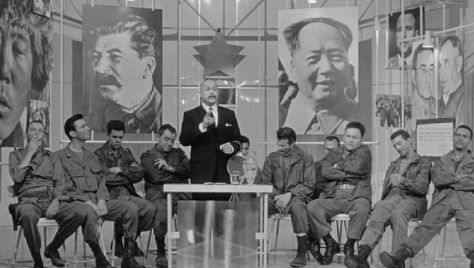
There’s certainly more than just a perfunctory nod to Red hysteria John Frankenheimer’s 1962 cold war paranoia fest The Manchurian Candidate, which was the last assassination thriller of note released prior to the zeitgeist-shattering horror of President Kennedy’s murder. Oddly enough, Frank Sinatra was involved in this project as well.
Sinatra plays a Korean War vet who reaches out to help a buddy he served with (Laurence Harvey). Harvey is on the verge of a meltdown, triggered by recurring war nightmares. Sinatra has been suffering the same malady (both men had been held as POWs by the North Koreans). Once it dawns on Sinatra that they both may have been brainwashed during their captivity for very sinister purposes, all hell breaks loose.
In this narrative (based on Richard Condon’s novel) the assassin is posited as an unwitting dupe of a decidedly “un-American” political ideology; a domestic terrorist programmed by his Communist puppet masters to kill on command. While many of the Cold War references have dated, the film remains a solid and suspenseful political thriller (Jonathan Demme’s 2004 version was an interesting take, but I much prefer the original).

After the events of November 22, 1963, Hollywood took a decade-long hiatus from the genre; it seemed nobody wanted to “go there”. But after Americans had mulled a few years in the sociopolitical turbulence of the mid-to-late 1960s (including the double whammy of losing Robert F. Kennedy and Martin Luther King to bullets in 1968), a new cycle of more cynical and byzantine conspiracy thrillers began to crop up (surely exacerbated even further by Watergate).
The most significant shift in the meme was to move away from the concept of the assassin as a dupe or an operative of a “foreign” (i.e., “anti-American”) ideology; some films postulated that shadowy cabals of businessmen and/or members of the government were capable of such machinations. The rise of the JFK conspiracy cult (and the cottage industry it created) was probably a factor as well.
One of the earliest examples was the 1973 film Executive Action, directed by David Miller, and starring Burt Lancaster and Robert Ryan. Dalton Trumbo (famously blacklisted back in the 50s) adapted the screenplay from a story by Donald Freed and Mark Lane.
A speculative thriller about the JFK assassination, it offers a scenario that a consortium comprised of hard right pols, powerful businessmen and disgruntled members of the clandestine community were responsible. Frankly, the premise is ultimately more intriguing than the film itself (which is flat and talky), but the filmmakers at least deserve credit for being the first ones to “go there”. The film was a flop at the time, but has become a cult item; as such, it is more of a curio than a classic. Still, it’s worth a watch.

1974 was the banner year, with two outstanding offerings from two significant directors-The Conversation, written and directed by Francis Ford Coppola, and The Parallax View, directed by Alan J. Pakula and adapted by David Giler, Lorenzo Semple, Jr. and Robert Towne from Loren Singer’s novel.
The Conversation does not involve a “political” assassination, but does share crucial themes with other films here (it was also an obvious influence on Brian De Palma’s 1981 thriller, Blow Out, in which a movie sound man inadvertently captures a recording of a car “accident” that may have actually been a political assassination).
Gene Hackman leads a fine cast as a free-lance surveillance expert who begins to obsess that a conversation he captured between a man and a woman in San Francisco’s Union Square for one of his clients is going to directly lead to the untimely deaths of his subjects.
Although the story is essentially an intimate character study, set against a backdrop of corporate intrigue, the dark atmosphere of paranoia, mistrust and betrayal that permeates the film mirrors the political climate of the era (particularly in regards to its timely proximity to the breaking of the Watergate scandal).

Alan J. Pakula’s 1974 thriller The Parallax View, on the other hand takes the concept of the dark corporate cabal one step further, positing political assassination as a sustainable capitalist venture…if you can perfect a discreet and reliable algorithm for screening and recruiting the right “employees”.
Warren Beatty gives an excellent performance as a maverick print journalist investigating a suspicious string of untimely demises that befall witnesses to a U.S. senator’s assassination in a restaurant atop Seattle’s Space Needle. The trail leads him to a clandestine recruiting agency called the Parallax Corporation.
The screenplay by David Giler and Lorenzo Semple Jr. (based on the 1970 novel by Loren Singer, with an uncredited rewrite by Robert Towne) contains obvious allusions to the JFK assassination; e.g. it has the “assassin as patsy” scenario, and features a closing scene with a slow, ominous zoom out on a panel of men bearing a striking resemblance to the Warren Commission, sitting in a dark chamber solemnly reciting their “conclusive” findings on what has transpired (although we know better).
The supporting cast includes Hume Cronyn, William Daniels and Paula Prentiss. Nice work by cinematographer Gordon Willis (aka “the prince of darkness”), who sustains the foreboding, claustrophobic mood of the piece with his masterful use of light and shadow.

There are two more significant films in this cycle worth a mention-Sydney Pollack’s Three Days of the Condor (1975) and William Richert’s Winter Kills (1979).
Pollack’s film, which was adapted by Lorenzo Semple, Jr. and David Rayfiel from James Grady’s novel “Six Days of the Condor”, puts a unique twist on the idea of a government-sanctioned assassination; here, you have members of the U.S. clandestine community burning up your tax dollars to scheme against other members of the U.S. clandestine community (there’s no honor among conspirators, apparently).
Robert Redford, Faye Dunaway, Cliff Robertson and Max von Sydow head an excellent cast. The film conveys the same dark atmosphere of dread that infuses The Conversation and The Parallax View.

Winter Kills is arguably the most oddball entry in the cycle; director William Richert adapted his screenplay from Richard Condon’s book (it’s worth noting that Condon also wrote the conspiracy thriller The Manchurian Candidate, which was adapted for the screen twice).
Jeff Bridges stars as the (non-political) half-brother of an assassinated president. After witnessing the deathbed confession of a man claiming to be a “second gunman”, he reluctantly gets drawn into a new investigation of his brother’s murder nearly 20 years after the matter was allegedly put to rest by the findings of the “Pickering Commission”.
John Huston chews the scenery as Bridges’ father (a larger-than-life character said to be loosely based on Joseph Kennedy Sr.). The cast includes Anthony Perkins, Eli Wallach, Sterling Hayden, Ralph Meeker, Toshiro Mifune, Richard Boone, and Elizabeth Taylor.
The film vacillates between genuine conspiracy thriller and a broad satire of other byzantine conspiracy thrillers–but is eminently watchable, thanks to an interesting cast and a screenplay that, despite ominous undercurrents, delivers a great deal of dark humor.

The obvious bookend to this cycle is Oliver Stone’s controversial 1991 film JFK, in which Gary Oldman gives a suitably twitchy performance as Lee Harvey Oswald. However, within the context of Stone’s film, to say that we have a definitive portrait of JFK’s assassin (or “assassins”, plural) is difficult, because, not unlike Agatha Christie’s fictional detective Hercule Poirot, Stone suspects no one…and everyone.
The most misunderstood aspect of the film, I think, is that Stone is not favoring any prevalent narrative; and that it is by the director’s definition a “speculative” political thriller. Those who have criticized the approach seem to have missed that Stone himself has stated from the get-go that his goal was to provide a “counter myth” to the “official” conclusion of the Warren Commission (usually referred to as the “lone gunman theory”).
It is a testament to Stone’s skills as a consummate filmmaker that the narrative he presents appears so seamless and dynamic, when in fact he is simultaneously mashing up at least a dozen possible scenarios. The message is right there in the script, when Donald Sutherland’s “Mr. X” advises Kevin Costner (as New Orleans D.A. Jim Garrison) “Oh, don’t take my word for it. Don’t believe me. Do your own work…your own thinking.”

There was a mini-“revival” of the cycle during the 2000s, in the form of Niels Mueller’s 2004 true crime drama, The Assassination of Richard Nixon, and Gabriel Range’s 2006 “speculative thriller”, Death of a President (my review).
The Assassination of Richard Nixon, based on thwarted assassin Samuel Byck’s bizarre scheme to kill President Nixon in 1974, is the superior of the two films; but their respective “lone gunmen” share a similar pathology. Nixon’s would-be assassin Byck (Sean Penn) is the classic “angry white male” …a loser in marriage and career who cracks up and holds the President responsible for his own failures.

*SPOILER AHEAD* In Death of a President, the (fictional) assassin of President George W. Bush (a troubled 1991 Gulf War vet who lost his son in the second Iraq war) also holds the POTUS responsible for his personal problems (interestingly, this character is African-American; an anomaly within the typical American political assassin profile).

Even though it doesn’t fit quite so neatly into the “political assassination” category, no examination of the genre would be complete without a mention of Martin Scorsese’s Taxi Driver (1976). In my review of the 2008 film, The Killing of John Lennon, I wrote:
There is a particularly creepy and chilling moment of “art-imitating-life-imitating-art-imitating life” in writer-director Andrew Piddington’s film, The Killing of John Lennon, where the actor portraying the ex-Beatles’ stalker-murderer deadpans in the voice over:
“I don’t believe that one should devote his life to morbid self-attention, I believe that one should become a person like other people.”
Anyone who has seen Scorsese and Shrader’s Taxi Driver will instantly attribute that line to the fictional Travis Bickle, an alienated, psychotic loner and would be assassin who stalks a political candidate around New York City. Bickle’s ramblings in that film were based on the diary of Arthur Bremer, the real-life nutball who grievously wounded presidential candidate George Wallace in a 1972 assassination attempt.
Although Mark David Chapman’s fellow loon-in-arms John Hinckley would extrapolate even further on the Taxi Driver obsession in his attempt on President Reagan’s life in 1981, it’s still an unnerving epiphany in Piddington’s film, an eerie and compelling portrait of Chapman’s descent into alienation, madness and the inexplicable murder of a beloved music icon.
So what is it that (the fictional) Travis Bickle, and real-life stalkers Arthur Bremer, Mark David Chapman, John Hinckley (and possibly, the Tucson shooter) all have in common?
They represent a “new” breed of American assassin. They aren’t rogue members of the government’s clandestine community, “patsies” for some deeper conspiracy, or operatives acting at the behest of dark corporate cabals. And although their targets are in most cases political figures, their motives don’t necessarily appear to be 100% political in nature.
More often than not, they are disenfranchised “loners”, either by choice or precipitated by some kind of mental disturbance. Many of them fit the quintessential “angry white male” profile; impotent with rage at some perceived persecution (or betrayal) by specific people, ethnic groups, or society in general.
One thing we do know for sure, and the one thing they all share as U.S. citizens, is that they had no problem getting their hands on a firearm. I know-“Guns don’t kill people. People do.” But still.
So what about that other issue that has come up-the possibility that inflammatory vitriol from high-profile demagogues can trigger homicidal rage from someone who is already starting to crack?
There are at least two films that have breached this scenario, if perhaps only tangentially-Sidney Lumet’s Network (1976) and Oliver Stone’s Talk Radio (1988).

*SPOILERS AHEAD* In Network, written by the late great Paddy Chayefsky, respected news anchor Howard Beale has a mental meltdown on air, announcing his plan to commit public suicide, on camera, in an upcoming newscast.
When the following evening’s newscast attracts an unprecedented number of viewers, some of the more unscrupulous programmers and marketers at the network smell a potential cash cow, and decide to let Beale rant away in front of the cameras to his heart’s content, reinventing him as a “mad prophet of the airwaves” and giving him a nightly prime time slot.
Eventually, some of the truthiness in his nightly “news sermons” hits a little too close to home regarding some secret business dealings that the network has with some Arab investors, and it is decided that his program needs to be cancelled (with extreme prejudice). And besides, his ratings are slipping, anyway. So the network hires a team of hit men to assassinate him on air.
Obviously, this film is satirical in nature, through and through, but the idea of a media demagogue precipitating his own demise by hammering away with inflammatory on-air rants night after night is, in a fashion, oddly prescient of our current political climate.

Talk Radio, on the other hand, does have some grounding in reality, because its screenplay (by Stone and Eric Bogosian) is based on a play (co-written by Bogosian and Tad Savinar), which itself was based on a non-fiction book (by Stephan Singular) about Denver talk show host Alan Berg, who was ambushed and shot to death in his driveway by members of a white nationalist fringe group in 1984. Berg was an outspoken liberal, who frequently targeted neo-Nazis and white supremacists in his on-air rants. Bogosian reprises his stage role as “shock jock” Barry Champlain, who meets with the same fate.
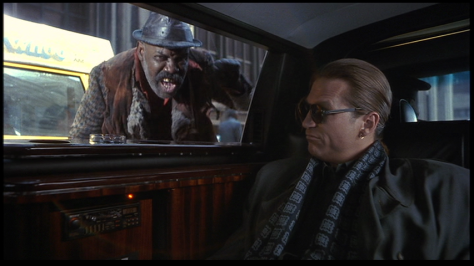
Finally, there is one more film that squeaks into this category-Terry Gilliam’s The Fisher King (1991). Jeff Bridges plays a successful late night radio talk show host whose career literally crashes overnight after a disturbed fan goes on a murderous shooting spree at an upscale restaurant after he hears the DJ exclaim, “They must be stopped before it’s too late…it’s us or them!” as part of a (tongue-in-cheek) anti-yuppie diatribe on his show.
One can’t help but be reminded of the Rush Limbaugh apologists who always attempt to douse any criticism of his vile hate rhetoric with the tired old “He’s just an entertainer!” meme.
So what can we learn about last Saturday’s shooting by analyzing these particular films, if anything? Frankly, I don’t feel any more enlightened about the “whys” behind this senseless violence than I did when I started this exercise.
Perhaps Bill Maher was not “oversimplifying”, after all, as I postulated earlier. Maybe the equation really is as simple as “A well armed country + A lot of nutty people = A bad combination”.
Is change even possible? Maybe we’re already on the right path by continuing to engage in the dialogue we’re engaged in and asking the questions we’re asking. Then again…like the man said: “Don’t take my word for it. Don’t believe me. Do your own work…your own thinking.”





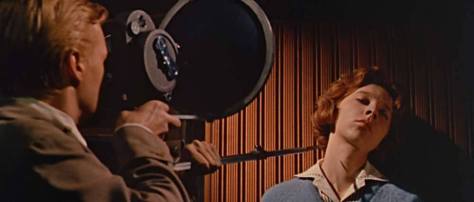






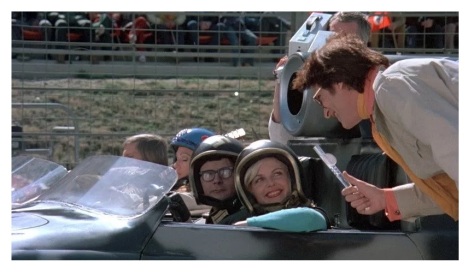 Then there is Paul Bartel’s 1975 cult classic, Death Race 2000, depicting a dystopian America where public murder literally has become a popular televised sporting event, in which competing race drivers earn points for each luckless pedestrian they can run over and kill.
Then there is Paul Bartel’s 1975 cult classic, Death Race 2000, depicting a dystopian America where public murder literally has become a popular televised sporting event, in which competing race drivers earn points for each luckless pedestrian they can run over and kill.







